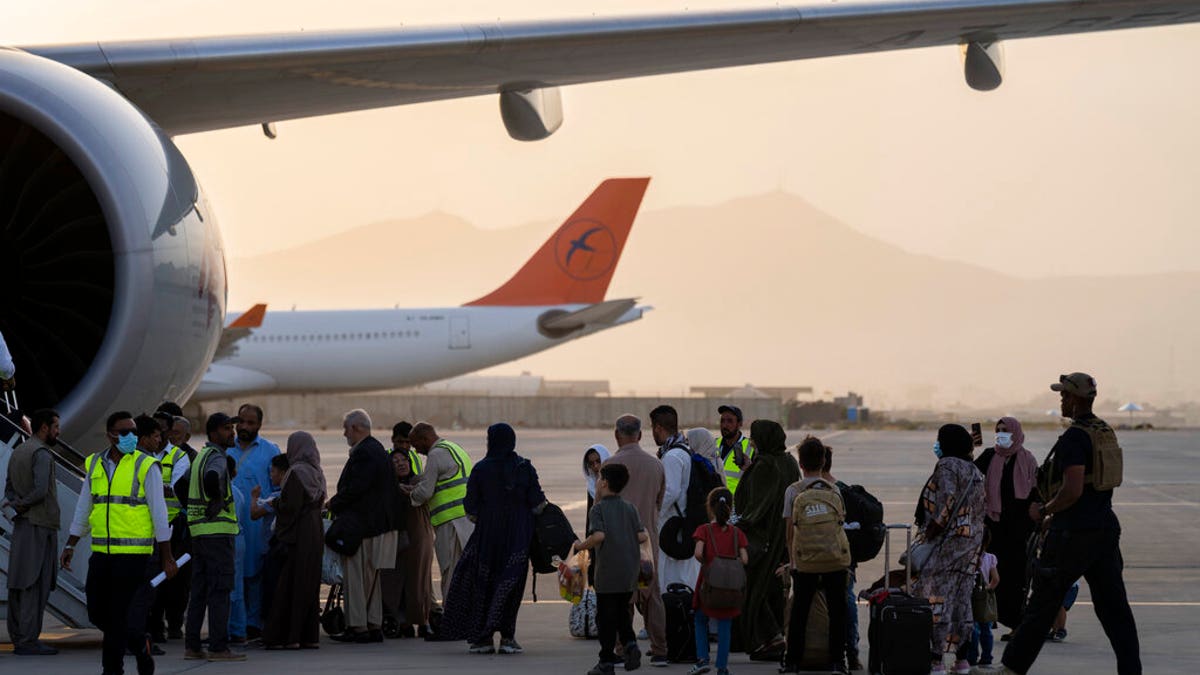Afghan evacuees 'not fully vetted' before entering America: Inspector General report
Fox News White House correspondent Peter Doocy reports from the North Lawn on a recently released Inspector General finding that many Afghan refugees coming into the U.S. were not completely honest with immigration on 'Special Report.'
The Pentagon Office of Inspector General (OIG) will review a whistleblower’s allegations that hundreds of Afghan evacuees entered the U.S. despite their appearance on a Pentagon watchlist — and claims that officials did not follow correct procedures.
In a letter to Sens. Ron Johnson, R-Wis., and Josh Hawley, R-Mo., acting Inspector General Sean O’Donnell says his office will conduct a review next fiscal year about allegations "that hundreds of Afghan evacuees were allowed to enter the United States despite appearing on the DoD’s Biometrically Enabled Watchlist, and that officials at the National Security Council and DoD did not follow proper procedures when processing evacuees in Afghanistan and at staging bases."
The Defense Department whistleblower had reported to Johnson and Hawley that 324 of the more than 76,000 evacuees brought to the U.S. from Afghanistan in the wake of the U.S. withdrawal have appeared on the Pentagon’s watchlist — which includes known or suspected terrorists.
A prior report by the Pentagon’s IG in February found that at least 50 evacuees were brought to the U.S. whose information indicated "potentially serious security concerns." The report also revealed that officials were unable to locate dozens of individuals with "derogatory information" that would have made them ineligible for parole into the U.S.

Passengers board a Qatar Airways aircraft at the airport in Kabul, Afghanistan, on Sept. 9, 2021. ((AP Photo/Bernat Armangue))
A footnote in that report stated that the "significant security concerns include individuals whose latent fingerprints have been found on improvised explosive devices and known or suspected terrorists" and for which officials would send that derogatory information to appropriate Pentagon personnel.
The whistleblower's allegations would indicate that the issue might be more serious than what the IG initially revealed. According to the Republican lawmakers, the whistleblower also accused political appointees of trying to "cut corners" on processing and abbreviate biometric tests.
The evacuation of tens of thousands of Afghans began as the U.S. began withdrawing from Afghanistan and the Taliban quickly took over the country. Evacuees were transported first to "lily pad" countries for vetting and screening before being transported to the U.S.
The Biden administration has repeatedly defended what it has described as a "rigorous and multi-layered screening and vetting process [which] begins overseas and is conducted by intelligence, law enforcement, and counterterrorism officials from across the U.S. Government — including from the Departments of Defense, Homeland Security, and State; Federal Bureau of Investigation; National Counterterrorism Center; and other Intelligence Community partners."
However, Republicans have repeatedly expressed concern about the vetting process, especially given the limited information available on many of the evacuees.
Sen. Hawley asked FBI Director Christopher Wray about the whistleblower’s claims at a Senate hearing last month. Wray said that he did not know the exact number, but said that there are "a number of individuals through our joint-terrorism task forces that we are actively trying to investigate as a result."
Wray also defended the vetting process.
"This was a massive number of people to be vetting in an extraordinarily short period of time," he said. "And, inevitably, it raises concerns."
The letter from the Pentagon’s inspector general comes a day after the Department of Homeland Security’s inspector general issued a report outlining its findings that officials lacked "critical data" to properly vet and screen some evacuees.
"We determined some information used to vet evacuees through U.S. Government databases, such as name, date of birth, identification number, and travel document data, was inaccurate, incomplete, or missing. We also determined [Customs and Border Protection] admitted or paroled evacuees who were not fully vetted into the United States," the report said.
CLICK HERE TO GET THE FOX NEWS APP
"As a result, DHS may have admitted or paroled individuals into the United States who pose a risk to national security and the safety of local communities," the report continued.
DHS pushed back against the report, defending what it described as an "unprecedented whole-of-government effort" and said that "all Afghan nationals were screened, vetted and inspected prior to parole into the United States."
















































